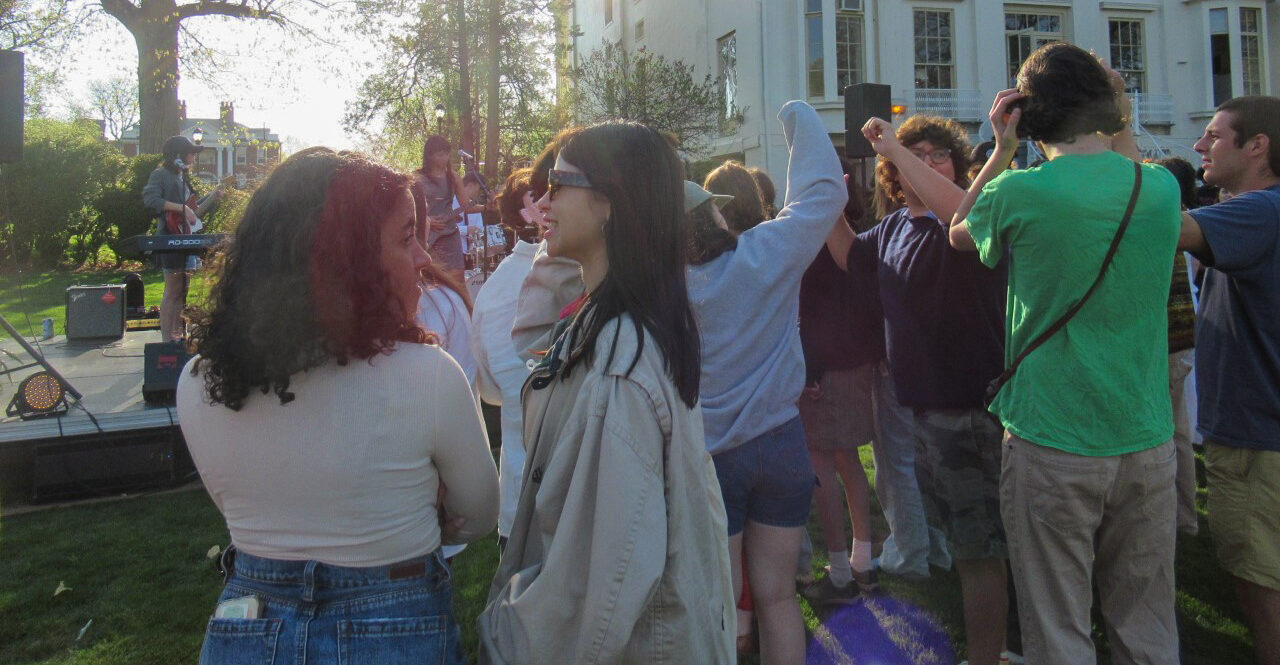Garden Festival: A ‘non-traditional thesis’ for Earth Day

By Maia Bronfman ’24
Talia Zitner ’23 organized the Garden Festival under the mentorship of Professor of Physics Brian Stewart as a “non-traditional thesis,” about sustainability and community in recognition of Earth Day, she said.
Student performers and bands, including Maganda, High Standards, Noise Baby, Loose Geese, and Lily Gitlitz, played throughout the afternoon and into the evening on Friday, April 21. Zzzahara and Billy Woods, visiting musicians, closed the event in the backyard of Russell House.
Zitner—an English and environmental studies double-major—started working on the festival a year ago, but it was inspired by her earlier experience transferring to Wesleyan. “I was really excited to be on a campus that cared so much about sustainability, but the pandemic caused a splinter in the sustainability efforts and the community on campus. With my senior project I wanted to combine those two things and celebrate the efforts of the Wesleyan sustainability community,” Zitner said.
Zitner hoped the festival prompted the question: “What does it mean to be stewards of this place even though we’re only here for 4 years?” She said she wanted the conversation to be fun, exciting, and in a “low pressure, low impact environment.”
To ensure there was no financial barrier to entry for students, Zitner raised funds from the College of the Environment and the Shed, a student music collective.
“It was important for me to have as many folks as possible able to participate in this. I wanted to put money in students’ pockets and in the pockets of folks who are doing really important sustainability work,” Zitner said.
From behind the botany club stand, Zitner looked out at the students gathered among the airborne hacky sacks and frisbees. “I love seeing everybody’s faces and everybody having a really good time and seeing their friends and seeing their friends play music and buying their friends products. It is super exciting for me. I’m so glad we were able to pull it off,” she said.
Student pop-up shops surrounded the stage and crowd area, offering orchids, starfish earrings, and sewing lessons, among other things environmentally oriented. Zitner had invited students involved in sustainability projects through clubs and the College of the Environment.
Hundreds of students visited the festival. They painted rocks at one stand and bartered for pothos at another, whenever one of their friends wasn’t on stage.
“I love it out here today I’ve been at every station. I got a really cool shirt, all the bands are really great. I love Wesleyan,” Coco Cooley ’26 said, donning a snowflake shirt she had just gotten from the free thrift store hosted by Annie Volker ’24.
As the sun set, attendees settled into the next phase of the evening. Zzzahara, a Los Angeles-based band invited by Zitner, hit the stage and began to play its set.
Near the end of the set, the guitarist asked for gloves from the crowd. His hands were cold from the frigid temperatures.
Ari Gonzáles Silas ’25, who had already been at the festival for hours, turned to her friend. She didn’t have gloves, but she had an idea.
“I’ll be right back, I’m going to microwave potatoes,” she said.
About eight minutes later, the time it might take to microwave and then transport hot potatoes, Gonzáles Silas ran across High Street and then through the bushes into the backyard of Russell House. She went to the stage and held the hot potatoes wrapped in cloth up to the guitarist.
The guitarist, astounded by how warm the potatoes were, gave one to the drummer; whose expression read the same.
During the last set, when performer Billy Woods wasn’t rapping, he was commenting on the hot potato that was left on the stage. Only one. Apparently, it maintained its temperature throughout, Woods said.
Gonzáles Silas eventually retrieved her cloth from the guitarist, keen to reuse it in another endeavor.

